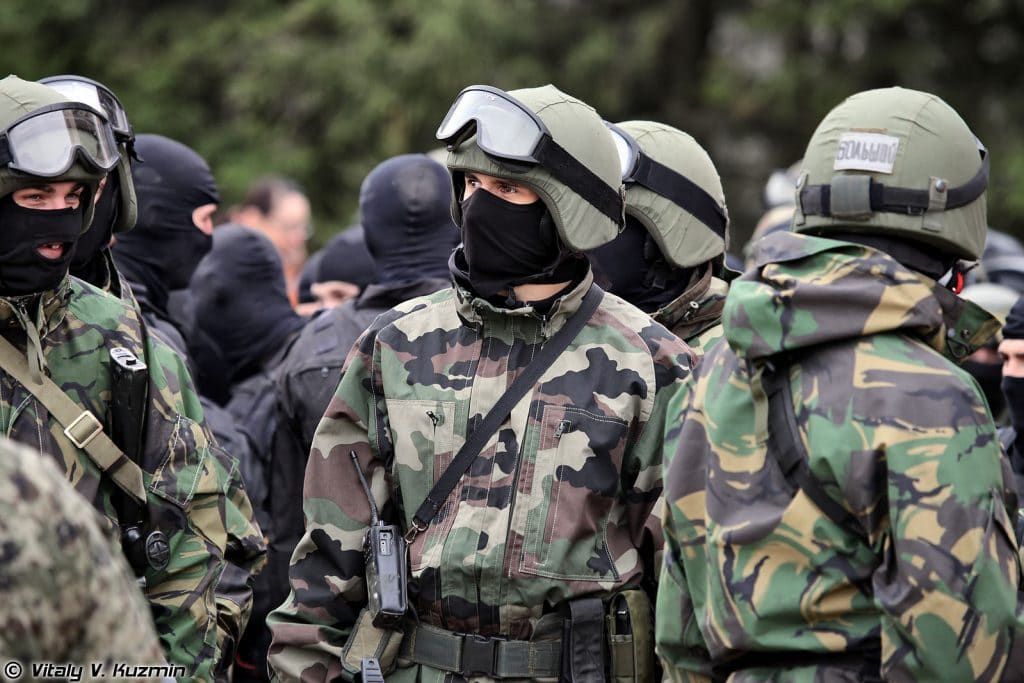Russian forces leave Chernobyl; UN watchdog offers Ukraine more help
By Susan D’Agostino | April 1, 2022
 Internal Troops of the Ministry for Internal Affairs (Russia). Credit: Vitaly V. Kuzmin. Accessed via Wikimedia Commons. CC BY-SA 4.0.
Internal Troops of the Ministry for Internal Affairs (Russia). Credit: Vitaly V. Kuzmin. Accessed via Wikimedia Commons. CC BY-SA 4.0.
Ukraine informed the International Atomic Energy Agency (IAEA) this week that the Russian troops that took control of the former Chernobyl Nuclear Power Plant in the first days of the war have left and headed in the direction of Belarus. The IAEA expects to send assistance and a support mission to Chernobyl in upcoming days. Though the Chernobyl Nuclear Power Plant—the site of the world’s worst nuclear disaster in 1986—is no longer operational, it requires constant management.
“Our workers have told us that they are alone in the nuclear power plant,” Kateryna Pavlova, Chernobyl’s Head of the Department for International Cooperation and Public Relations, told the Bulletin yesterday. “They cannot see Russian soldiers or tanks around the plant’s perimeter.”
IAEA Director General Rafael Mariano Grossi, who met today with Russian officials in Kaliningrad, announced that he will head the assistance and support mission. The effort will be the first in a series of nuclear safety and security missions to Ukraine providing equipment, on-site IAEA experts, remote advice and support, and a rapid-assistance mechanism in the event of another emergency during the ongoing war. When Russia took control of the plant, the IAEA found the process of trying to establish facts—such as what was out of service because of a loss of power or physical damage—“laborious,” according to Grossi. He also called the Russian troop departure from Chernobyl is “a step in the right direction.”
“We have been saying that the plant needed to be operated by its own natural operators, … that it had to have its physical integrity protected, that the people had to work under normal circumstances,” Grossi said. “We were raising this issue from day one.”
Grossi reported that radiation levels around the plant were “quite normal” after a “relatively higher level of localized radiation” from heavy vehicle movement during the plant’s occupation and possibly again when the troops left.
Energoatom, Ukraine’s state nuclear company, also reported that Russian forces dug trenches in the most contaminated part of the Chernobyl Exclusion Zone where they received “significant doses” of radiation. The IAEA has not confirmed this report. Some Russian soldiers apparently did not realize they were in a radiation zone, according to Reuters.
Not all experts are convinced that a large number of Russian troops are suffering from radiation illness or, if they are, that the alleged sickness originated from known radioactive dust present in Chernobyl’s environment.
“I’m pretty skeptical of some of these reports,” Edwin Lyman, a nuclear expert with the Union of Concerned Scientists tweeted. “Soldiers would have to be exposed at dose rates orders of magnitude greater than the ambient rates to experience acute radiation-related effects.”
“We’ve heard [Russian forces] were digging trenches in the Red Forest,” Pavlova said referring to a region surrounding the plant where dead, contaminated trees were bulldozed and buried following the nuclear accident. “But I’m not 100 percent sure so many soldiers would be contaminated that way.” Pavlova suggested that acute radiation sickness is more likely to result from “activities with highly radioactive materials, not with the Red Forest.”
The IAEA plans to independently assess whether Russian troops received high doses of radiation while they occupied Chernobyl. Meanwhile, wildfires continue to burn in the area surrounding the plant, which risks mobilizing and dispersing radioactive contaminants left over from the accident 36 years ago. During the Russian occupation, Ukrainian firefighters were unable to access the region.
“This is one more issue for our military and fire fighters,” Pavlova said.
Together, we make the world safer.
The Bulletin elevates expert voices above the noise. But as an independent nonprofit organization, our operations depend on the support of readers like you. Help us continue to deliver quality journalism that holds leaders accountable. Your support of our work at any level is important. In return, we promise our coverage will be understandable, influential, vigilant, solution-oriented, and fair-minded. Together we can make a difference.
Keywords: Chernobyl, Russia, Ukraine, nuclear power, nuclear risk, war
Topics: Nuclear Energy, Nuclear Risk















So how did the fire get started around the plant? Did the Russian army set these fires?
Good question. Even if it is natural causes, eg lightening, they should let us know, If it was started by either side, then that is dreadful!